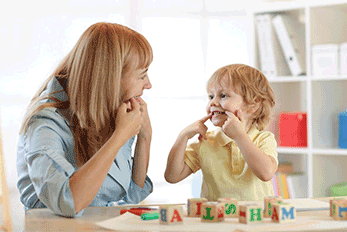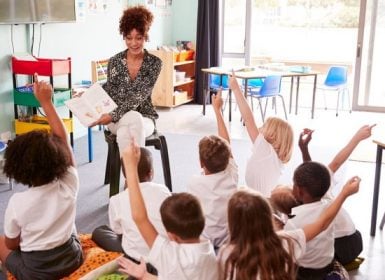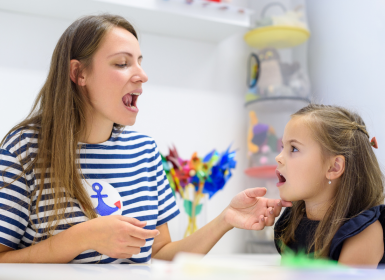
This might be a funny topic to cover, but answering the question ’What is speech?’ isn’t completely straightforward. So, we’re going to go into it and explore the many intricacies of speech.
Speech refers to the production of individual sounds in words. For example, in the word ‘dog’ there are three speech sounds that combine to make the word (‘d’, ‘o’ and ‘g’). Children develop speech from six months of age, when they begin to babble. As children develop, they are able to use more complex sounds.
Typically, most English-speaking children develop speech sounds at the following ages:
- 2 to 3 years of age: p, b, m, d, n, h, t, k, g, w, ng, f, y
- 4 years of age: l, j, ch, s, v, sh, z
- 5 years of age: r, zh (‘s’ sound in Asia), th (voiced)
- 6 years of age: th (voiceless)
You and your child may sound different because you have an accent, dialect or if English is not your first language. Don’t worry, this is not something to be worried about.
Why is speech important?
Clear speech is important for good oral communication, including expressing needs and wants, requesting, and forming relationships with others. If a child does not have many speech sounds or has difficulty producing certain sounds, they may substitute, leave off, add or change the sounds in words, making it difficult for them to be understood by others.
Difficulties with speech are usually due to articulation-based or phonological errors:
- Articulation errors refer to difficulties a child may have producing a certain sound, as they do not know where to place their lips, teeth, tongue or jaw to produce the sound. For example, with a lisp, a child may produce the ‘s’ sound with their tongue between their teeth (instead of behind) and this changes the sound into a ‘th’ sound.
- Phonological errors refer to typical error patterns in speech development that children use when they are learning to talk. For example, a child may say ‘nana’ for banana, ‘lellow’ for ‘yellow’, ‘dat’ for ‘that’, ‘tat’ for ‘cat’, etc. This may make it difficult for others to understand them and can lead to frustration.
Having clear speech sounds is also important for literacy development, as children need to be able to correctly match sounds with letters. If a child produces a sound incorrectly (e.g. ‘th’ for ‘f’, > ‘thumb’ becomes ‘fum’) this will make it difficult for them to learn letter-sound matching and spelling.
How can you help your child develop their skills?
If you have concerns about your child’s speech, you should consult a Certified Practising Speech Pathologist (CPSP). A Speech Pathologist will be able to assess, diagnose and treat a speech sound disorder. Treatment may include the following:
- Learning the correct way to make sounds
- Learning to tell when sounds are right or wrong
- Practicing sounds in different words
- Practicing sounds in longer sentences




